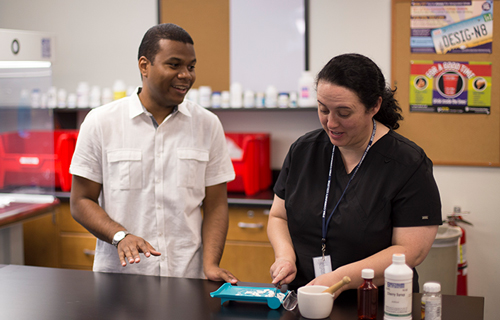
Black Students Encouraged to Pick STEM Careers
Presenting role models a big part of Black History Month
Erica Martin is an Academic Success Counselor based at Pima’s Downtown Campus, helping Science, Technology, Engineering and Math students. She is a University of Arizona graduate who has worked at Pima since 2003. She has a master’s degree from Northern Arizona University (Education, Counseling-Human Relations).
As part of Pima’s Black History Month celebrations, she helped organize “My STEM Story,” featuring Misha Dawson, M.B.A., B.S., Raytheon Missile Systems’ Senior Director of Digital Technology, Digital Engineering Solutions, on February 22nd, 2022 on Zoom.
The following Q&A with Martin is edited for clarity and conciseness.
Explain the value of promoting STEM successes of Black Americans during Black History Month.
There is tremendous value in promoting STEM successes of Black Americans. I grew up learning about Dr. Daniel Hale Williams, who performed the first successful open heart surgery and George Washington Carver’s contributions in horticultural gains. In the Midwest, these scientists were celebrated in elementary school on a yearly basis. The images remained in my mind as far as what was “vaguely” possible. Personally, becoming a scientist seemed unreachable for me, as a youth as I didn’t know any Black scientist or, for that matter, Black college graduates. The experience speaks to the impact of exposure and why it’s valuable. Having several, visible role models this year for Black History Month, is an intentional effort to demonstrate to students of color — and all students — what is possible, and help many of us to move past fixed mindsets.
Besides having their roles and contributions dismissed or downplayed historically, Black Americans are under-represented in STEM fields. During your lifetime and-or in your professional experience, have you seen more Blacks interested in STEM careers or specific STEM fields? Please explain.
Within my network and community of friends, I encounter Black individuals who work in STEM careers, such as engineering, medical, computer science and mathematics. However, Blacks and Hispanics are under-represented in STEM careers statistically. Black Americans are less likely to earn a degree in STEM and make up a lower percentage of STEM graduates. We are under-represented and significantly under-paid compared to our white counterparts. Whites make up 67% of all workers in STEM jobs compared to 9% for Blacks and 8% for Hispanics. The lack of interest could be for reasons tied to perceptions in the industry that it doesn’t need diversity.

How do you see America getting to a point where a significant number of Black Americans are not only making sustained major contributions in STEM, but also being duly acknowledged for their work and seen as leaders?
Educational initiatives such as early outreach to middle and high schools, is a necessity. When a career choice in STEM is solidified in high school, the likelihood that a student will choose a STEM major in college increases and so does the likelihood that they will complete a STEM degree.
Having several role models for Black History Month, is an intentional effort to demonstrate to students what is possible.
Once in college, Black students face challenges such as racial barriers, hostile campus climates, placement into remedial math courses and sometimes being talked out of pursuing STEM interests by advisors. So, they will need support in understanding the social impact of a STEM degree, support in financing their education, support with clarifying and solidifying their values and STEM interest, support in math achievement, and support developing and-or maintaining the expectation of success and self-efficacy. This year’s Black History Month events have and will bring awareness and exposure to college students and may, for students of color, increase their expectations to succeed in STEM careers.
Tell us a little about Misha Dawson, featured in the Feb. 22 Zoom event. What about her story do you hope will resonate with the audience?
Misha Dawson is Senior Director of Digital Technologies, Digital Engineer Solutions at Raytheon Missile Systems. She gives back to her community. She is a distinguished alumni of her alma mater, a wife and mother. Misha’s story presents an opportunity for all of us, as hearers, to consider our own unique stories and what makes each of us great.
Is there anything else you would like to say about STEM or about Black History Month?
Black History Month highlights the many contributions we’ve made throughout history in the sciences and other fields. These contributions were groundbreaking and helped society as a whole. I take great pride in my identity as an African American woman while embracing the similarities and differences of others. I look forward to more opportunities to influence students in their success!